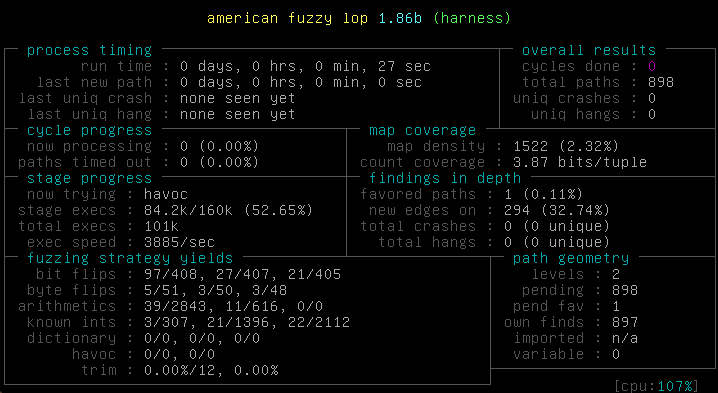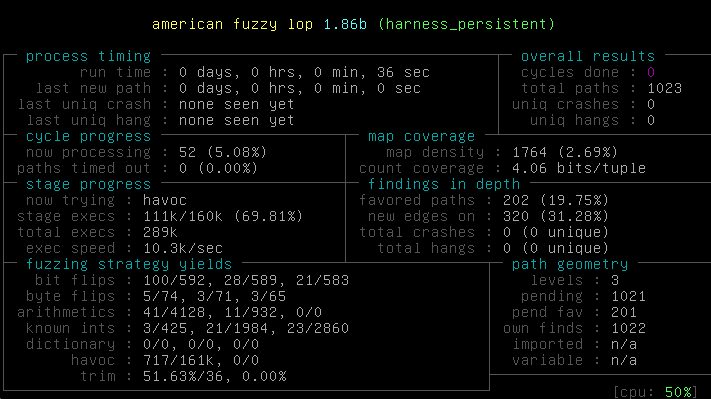
Fuzzing is an automated testing technique that involves automatically sending input to a program and monitoring its output. It's a way to test for reliability as well as identify potential security bugs. Compared to manual auditing, fuzzing will only uncover real bugs that are actually reachable.
Today we are fuzzing capstone. It's an open-source disassembly engine widely used in exploitation frameworks, disassemblers, debugging aids and other projects. You can take a look at a normal capstone usage here.
The fuzzer we'll use is the hot new thing: American Fuzzy Lop, AFL for short, a fuzzer that uses runtime guided techniques to create input for the tested program.
AFL's usual operation mode goes like this:
Internally, AFL checks if that input made the program reach new code path (either completely new blocks, or different sequence of blocks). If this is the case, the input is marked as 'interesting' and will be reused and remixed with other random or interesting inputs to try to reach deeper code path in the program, and yield more coverage.
To achieve runtime monitoring, AFL will inject code at compile time. This is done by substituting gcc or clang with AFL's wrappers: afl-gcc and afl-clang. The wrapper will call the normal compiler, then add the instrumentation code and produce a binary that can be monitored by afl-fuzz.
If you want to get a more thorough understanding of AFL's code coverage and how it generates new input, see AFL's technical details.
Let's write a test harness for the library we test, capstone. We'll keep it simple: input from stdin, and test only a small part of the library.
#include <stdlib.h> #include <unistd.h> #include "capstone/include/capstone.h" int main(int argc, char** argv) { // The buffer we will pass to the library uint8_t buf[128]; ssize_t read_bytes = read(stdin, buf, 128); csh handle; cs_insn *insn; size_t count; // cs_open and cs_disasm are the main functions needed to use capstone. // we feed them the data generated by AFL. // a normal program using capstone would then use the output of cs_disasm // to print a disassembly to the user for example if (cs_open(CS_ARCH_X86, CS_MODE_64, &handle) == CS_ERR_OK) { count = cs_disasm(handle, buf, read_bytes, 0x1000, 0, &insn); // don't forget to clean up after ourselves cs_free(insn, count); } else { return -1; } // close the capstone library cs_close(&handle); }
Let's run this with a random file as base. This is not ideal, but since the input is really small, the magic of the instrumentation should start to discover interesting values and branches pretty fast.
To compile this you'll need to install AFL (including llvm_mode, needed for the next section), clang and llvm.
# compile an instrumented version of capstone git clone https://github.com/aquynh/capstone.git cd capstone CC=afl-clang-fast ./make.sh cd .. # compile and link our test harness using capstone's static library afl-clang-fast -static harness.c capstone/libcapstone.a -o harness # generate inputs mkdir inputs dd if=/dev/random of=inputs/rand bs=64 count=1 afl-fuzz -i inputs -o findings ./harness

So far so good, AFL is running about 3.8k test/second, on just one core.
AFL_PERSISTENT.AFL has various tricks to speed up the fork step, but forking a process every time we want to test an input is still pretty slow. What if we could skip it entirely, and reuse the same process multiple times?
We are going to use AFL's in-process fuzzing. This time, we don't restart a new process for each new input. This will be much faster depending on the library.
To do so, the test harness is nearly the same: we just need to add a loop.
Here's the code for that:
#include <stdlib.h> #include <unistd.h> #include <signal.h> #include <string.h> #include "capstone/include/capstone.h" #include <inttypes.h> int main(int argc, char** argv) { csh handle; cs_insn *insn; size_t count; uint8_t buf[128]; ssize_t read_bytes; while (__AFL_LOOP(1000)) { // (re-) initialize the library and read new input read_bytes = -1; memset(buf, 0, 128); read_bytes = read(STDIN_FILENO, buf, 128); if (cs_open(CS_ARCH_X86, CS_MODE_64, &handle) == CS_ERR_OK) { // disassemble the bytes we just read using capstone count = cs_disasm(handle, buf, read_bytes, 0x1000, 0, &insn); // Don't leak memory. This is especially important in persistent mode, // because we reuse the process a significant number of times cs_free(insn, count); } cs_close(&handle); } return 0; }
__AFL_LOOP(1000) is a macro that detects if the program is running under AFL. If it is, the loop will run 1000 times and 1000 different inputs will be fed to the library. After that, the process is torn down then restarted by AFL. This ensures we regularly replace the process to avoid memory leaks.
But if the program runs on his own (i.e. launched with ./harness_persistent and not AFL) the loop runs only once. This way we can process testcases from the command line without looping a thousand time. This mean we can use gdb or automated tools to inspect the crashes found by the fuzzer using the same binary.
Let's try it out!
afl-clang-fast -static harness_persistent.c capstone/libcapstone.a -o harness_persistent afl-fuzz -i inputs -o findings ./harness_persistent

Twice faster! Pretty good for a 3 lines diff. The VM I use is dual core, so we can run one AFL instance per core:
afl-fuzz -i inputs -o multi_sync -M master ./fuzz_capstone
# In another tmux
afl-fuzz -i inputs -o multi_sync -S slave1 ./fuzz_capstone
# and in another pane we can get the summary stats
afl-whatsup -s multi_sync
[...]
Summary stats
=============
Fuzzers alive : 2
Total run time : 0 days, 0 hours
Total execs : 25 million
Cumulative speed : 26432 execs/sec
Pending paths : 1 faves, 4148 total
Pending per fuzzer : 0 faves, 2074 total (on average)
Crashes found : 0 locally unique
I let that run overnight and actually found a harmless bug. More on that in the next part, along with analysis of what we found, using AFL's tools (cmin, tmin, crash exploration mode), gdb and crashwalk.
In this article we